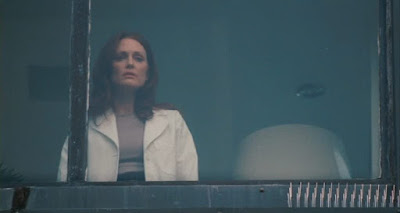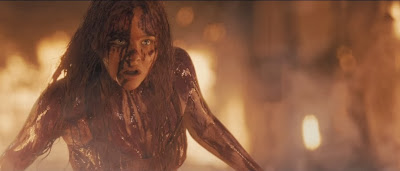or
Persona Non Grata
It's a little bit of an invasion, really. The actress (Natalie Portman) "doing personal research" on your life. Seems there's going to be an "independent" film about the notorious past of you, Gracie Atherton-Yoo (Julianne Moore), and the notorious affair with a 13 year old friend of her son's, got pregnant, was tried very publicly for child-rape, was convicted and sent to prison where she delivered their child, and, when released, married her now "of age" lover, Joe (Charles Melton). They've tried to live a normal life, but it's practically impossible, with the tabloids, the photographers, the neighbors. And with those who'd rather not forget.
Now, 20 years later, "this film" is being made (an earlier, exploitative TV Movie was made years ago without their participation or consent), and the Atherton-Yoo family is co-operating with this one in the desperate hope that it might make the film more sympathetic...or at least do no harm.
Do no further harm.So, the family has welcomed this woman, this actress Elizabeth Berry (Portman) to their home, and at a busy time: "the twins" (Gabriel Chung, Elizabeth Yu) are graduating high school, and that will leave Gracie and Joe, for the first time, empty-nesters. Their first daughter—you know, that one—(Piper Curda) is coming home from school for the first time since she left for school. For family. Special occasion. And...she's there. The actress.
But, the actress is just clueless enough that when she arrives at their doorstep for a meet-and-greet dinner that she (helpfully, of course) brings in a package she found left at the door-step of the house. That package is just another poop-a-gram from a harassing neighbor (or maybe it's not even a neighbor—they get them every week). She'll learn. It's her job to. Still, it's not a good start.
And Elizabeth is good at first. She hangs back, observing, talks to the sympathetic friends, makes notes, preliminary research. She witnesses son Charlie at dinner get a little belligerent and leave the table. Things are kind of tense. Elizabeth is sensitive to this and worries about her presence and reassures them that she is doing the research because she wants to portray them honestly and make it a "human story" (what else would it be?). She asks Gracie how they met, and when dinner's over, gets Joe's side of it and asks if she can visit him at his work. Then she starts to do some digging.
She interviews Gracie's ex-husband, the one she cheated on. She goes to the pet shop where Joe and Gracie were working and talks to the manager there, asking if she can go into the back-room where the two were caught, and when the manager goes back out front to check on a customer, Elizabeth tries to re-enact the scene where it happened. She goes to the lawyer who represented Gracie, and meets, by accident, the son who was friends with Joe (but is no longer) and he has issues. But, he's not the only one, apparently. Elizabeth goes to visit Joe at work and she's deliberately provocative, almost like she's re-enacting what might have led up to the affair at the pet shop. She speaks at daughter Mary's drama club and (of course) the first question from the students is about filming sex scenes and Elizabeth's answer makes Mary more than uncomfortable. Then, she asks Gracie to show her how she does her make-up.It's one of two sequences that director Todd Haynes sets up in front of a bathroom mirror. But, there's no mirror. Elizabeth and Gracie stand side-by-side playing as if a mirror was before them, but they're facing forward on screen, with us sitting in the place of the mirror. It's as if one isn't necessary because at this point, the two women are becoming reflections of each other.
We've already seen Elizabeth going through old tabloids, studying pictures of Gracie and imitating her poses, the way she folds her hands, the way she holds her mouth. Gracie acts differently around Elizabeth and is more capable of holding things together because that's the image she wants to give Elizabeth—it's how she wants to be portrayed. But, it's a tough act to pull off. In private with Joe, she is more flinty and breaks down often. But, with Elizabeth, she's thoughtful, calm, and nurturing.
And, at the same time Elizabeth is learning to "play" Gracie, she is "playing" Gracie, complimenting her, ingratiating, trying to get on her good side (even while not knowing that that is precisely the side Gracie is giving her). The two women start to meld into each other's psyches, becoming a third person, the "best" Gracie each can achieve. Both are acting "towards" that version, it's "the job," one for the family, one for the film.There's an amusing story in the "Trivia" section of imdb's listing for May December that "Julianne Moore (Gracie) did not notice Natalie Portman (Elizabeth) was improvising by mimicking her mannerisms in some scenes until later into filming." That's amusing if it's true, but Portman is doing it so subtly—even while her character is doing it more blatantly in the film—that Moore probably caught on when she was looking. Portman usually saves the mimicry for when Moore is out of eye-line and it's slightly spooky. But, then Portman's actress is "spooky," doing things for verisimilitude that most actors (I hope) wouldn't do.It's one of Haynes' most subtle films about the act of watching and being watched and how scrutiny changes things and not in an altogether good way. Layers and layers of scrutiny abound until the whole thing feels like it's under a microscope, at a time when we are all voyeurs, while simultaneously wanting our 15 minutes of fame...until we get it.


















































